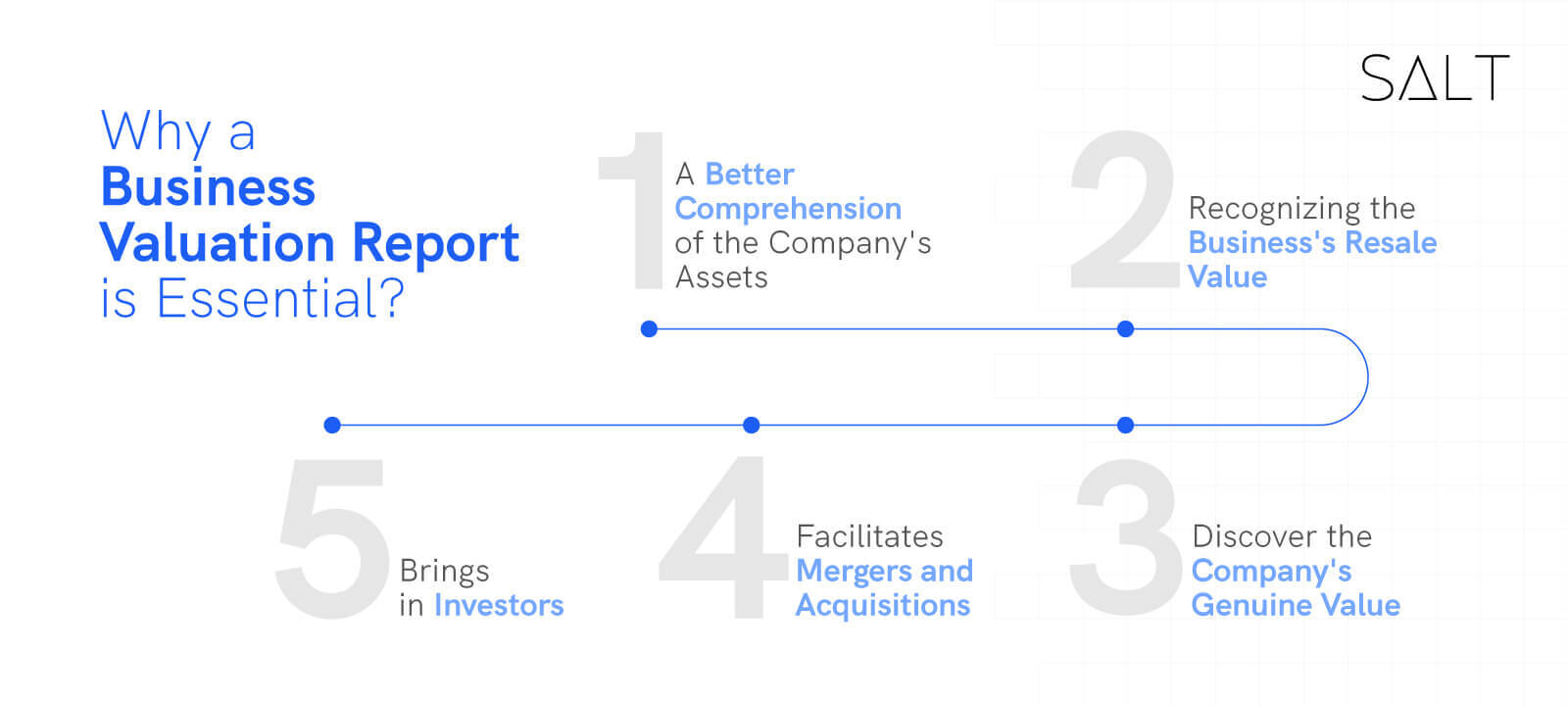
Business Valuation Report: Let’s understand it
A business valuation report is prepared to accurately describe and evaluate the value of a company or its assets while considering all market, industrial, and economic factors relevant to the startup or SME.
A business valuation report is a prescribed document for assessing the fair value of a business and is needed to serve various purposes, including taxation, sale value, establishing partner ownership, and other valuation purposes. The owners of a particular business, such as the founders of a startup or Board members of a company, turn to professional business evaluators to objectively estimate their business’s value.

The purpose of the valuation will decide the standard of value to be employed, the valuation strategy and the assumptions used to compute the evaluation. Each of these factors impacts the outcome of a business valuation.
A company or its assets should be valued for reasons such as:
A company may be sold, or a stake in it may be acquired
The combination of two businesses or an acquisition
Litigation
For taxation's sake
Insolvency/bankruptcy
Reporting finances periodically, etc.
Who Makes a Valuation Report?
Section 247 of the Companies Act states that,
“where a valuation is required to be made in respect of any property, stocks, shares, debentures, securities or goodwill or any other asset or net worth of a company or its liabilities under the provisions of this Act, it shall be valued by a person having such qualifications and experience and registered as a valuer in such manner and on such terms and conditions as may be prescribed and appointed by the audit committee or in its absence by the Board of Directors of that company.”
Decoding the legal jargon, we can say that a business valuation report for any SME or an Indian startup can be prepared by:
Land and Building: For the valuation of land and building, the registered valuer must be a graduate or post-graduate in Civil Engineering, town planning, or architecture and have a minimum of 3 to 5 years of experience.
Securities and Financial Assets: Any person who is a member of the ICAI, ICSI, or Institute of Cost Accountants of India or is a specialised MBA in Finance and has a minimum of 3 years of experience is eligible to evaluate.
Plant and Machinery: The registered valuer must be a graduate or post-graduate in Electrical or Mechanical Engineering, having a minimum experience of 3 to 5 years.
Why A Business Valuation Report is Essential?
A business valuation report provides the owners of a company or the founders of an Indian startup with a range of information and figures regarding the company's genuine worth or value in market competition, asset values, and income values. Every startup founder or SME owner needs to be familiar with this knowledge. To show business growth, the business valuation report should be obtained at least once a year.
Let’s discuss its significance in the context of Indian startups and SMEs:
1. A Better Comprehension of the Company's Assets
It is imperative to receive as accurate value assessment as possible. Estimates are not acceptable because they are generalisations. For business owners to obtain enough insurance coverage, decide how much to reinvest in the company, and how much to sell their company for while still generating a profit, specific numbers must be obtained from valuation methodologies, and a business valuation report serves that purpose.
2. Recognizing the Business's Resale Value
In order to dedicate more time to enhancing the company's value and obtaining a higher selling price, the valuation process should start well before the company is placed up for sale on the open market. As a business owner, you ought to be aware of the worth of your enterprise.
3. Discover the Company's Genuine Value
When determining whether to sell your business or not, knowing its genuine worth is frequently a deciding factor. It also helps to show how a company's earnings and value have increased over the years. Prospective purchasers, investors, and VCs also want to see evidence of a company's long-term, continuous growth before they invest funds and trust in the company or startup.
4. Facilitates Mergers and Acquisitions
Once you are aware of your company's valuation, you can bargain your way to the assessed valuation figures provided by a reputable and well-known valuation determination organisation. If you are being offered less for your company than it has been proven worth, you can reject the deal or suggest entering mediation. It will make it easier for both parties to come to a peaceful resolution.
5. Brings in Investors
The VCs and angel investors will want to see a complete company valuation report in case you're looking for new investors to help support the expansion of your startup or prevent it from going out of business. Additionally, you ought to provide prospective VCs and investors with a valuation forecast in light of their contributions. Investors are interested in knowing where their money is going and how they will make a profit. VCs, as potential investors, are more likely to invest when they can see how their money will advance the company, increase its value, and reinvest more in its products.
The Bottom Line
Even the finest valuer will struggle to get an appropriate value in a business valuation without accurate and complete data because it is a difficult procedure that calls for skill. Several online business valuation calculators are available right now, which may be helpful if you're curious about what your enterprise might be worth in general. But its' ideally always suggested to consult an expert.
Table by Salt helps Indian startups raising foreign capital get the valuation report for their fundraising. If you are looking for a hassle-free, digital first solution to sort all the banking and legal processes of the fundraising, Salt is the right address for you!


